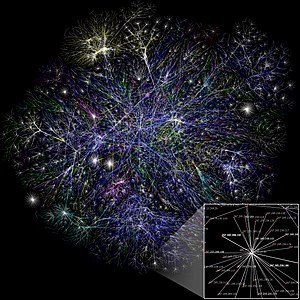|
The Internet Galaxy
The Internet Galaxy: Reflections on the Internet, Business, and Society is a book by Manuel Castells, Professor of Sociology and Professor of City and Regional Planning at the University of California. It was published by Oxford University Press in 2001. The title is a reference to The Gutenberg Galaxy, a 1962 book by Marshall McLuhan. It is regarded as a good introduction to Social informatics.[1] OverviewThe book contains 9 chapters. Castells starts with the history of Internet, focuses on the process of Internet evolution influence our society. He emphasizes the development of Internet from 1962 to 1995, the extension from ARPANET to WWW. Castells believes that "The openness of the Internet's architecture was the source of its main strength".[2] Then he states that the 'Internet Culture' is structured by four kinds of culture including: 'the techno-meritocratic culture', 'the hacker culture', 'the virtual communication culture', and 'the entrepreneurial culture'.[3] Next, Castells analyses the vital status of Internet in the business and economy fields, and he refers to the impact of virtual communication which is based on the Internet communication to the reality in the following chapter. In terms of the Politics of the Internet, Castells points that 'social movement' and 'the political process' use Internet as a new communication medium to 'acting' and 'informing'. And there is an issue between 'Privacy and Liberty in Cyberspace' relates to 'the politics of the Internet' is mentioned in this book. In the last three chapters, Castells analyses the Internet from multimedia, geography and 'the digital divide in a global perspective'. Finally, he talks about the challenges of the network society such as freedom of the Internet. Opening: The Network is the MessageThe title used for the preface or introductory text is called "Opening" and the name given to this Opening is "The Network is the Message". It is a mimicry of Marshall McLuhan's famous slogan "The medium is the message". By substituting network for medium, Castells reinforces McLuhan's message that, in this case, it is the network which is important not the content.[4] The opening may then be seen to be an invitation to explore the meaning of network via the content of the book. The word network itself is of ambiguous interpretation: infrastructure or society?[5] Both interpretations are at play in the book. Since Castells is by profession a sociologist, then one expects a focus on network as society. Lessons from the History of the InternetCastells introduces the label ″Libertarian″ to characterize all those who participated with "big science" and "military research" in bringing the Internet into being.[6] The history of the Internet is diverse and well documented. Castells makes considerable use of John Naughton's text, "A Brief History of the Future", who noted for example that the Request for Comment Feature (RFC), introduced by Steve Crocker in 1969-04-07,[7] not only gave rise to a de facto documenting of the research ideas at the time of their fermenting but also to the Open Source movement.[8] Castells gives his own take on the subject. Ultimately, for him, the Internet is a cultural creation. The Culture of the Internet
It is important to take note of how Castells understands and uses the word Network. For him, the network is a word that often has connotations of community. So, when he speaks of virtual networks he is not (necessarily) speaking of virtual networks in the technological sense but in the community sense of people networking. e-Business and the New Economy
Virtual Communities or Network Society?
The Politics of the Internet I: Computer Networks, Civil Society, and the State
Networked Social MovementsCastells shows how the Internet has been used for mobilizing people to support certain kinds of political, religious, or other social causes:[13]
The Politics of the Internet II: Privacy and Liberty in Cyberspace
This is that chapter of the book which one must read in the context of the pre-9/11 world. The End of PrivacyCastells mentions a few official programs of governments:[15]
Multimedia and the Internet: The Hypertext beyond Convergence
The Geography of the Internet: Networked Places
There are different ways in which to picture the geography of the Internet. The picture of the graph on the cover of the book[19] resembles that of Matt Britt shown on the right. The Digital Divide in a Global Perspective
Conclusion: The Challenges of the Network Society
e-LinksOne of the significant features of the book (published in 2001 before the September 11 attacks and around the time of the dot-com bubble) is the inclusion of the e-Links section at the end of every chapter. Each e-Link is given as a URL, followed by a short text of one or two lines to describe the content. For example, at the end of Chapter 6 "The Politics of the Internet II: Privacy and Liberty in Cyberspace", a collection of 4 e-Links is given:
and the short explanatory text following is "Websites providing technological resources to protect privacy." There is one major flaw associated with the e-Links. None of the e-Links in The Internet Galaxy provide "the date of last access". Notes
External references
|
||||||||||||||||||
